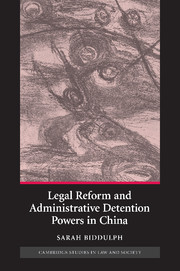Book contents
- Frontmatter
- Contents
- Preface
- Abbreviations
- Part 1 Introduction and conceptual framework
- 1 The problems of legal reform of police administrative detention powers
- 2 The legal field and the process of legal reform since 1978
- Part 2 Social order and administrative detention
- Part 3 Legal reform and its impact on administrative detention
- Part 4 Analysis and conclusion
- Appendix 1 Index of Legislation, administrative regulations, rules, normative documents, Party documents, speeches and cases
- Bibliography
- Index
2 - The legal field and the process of legal reform since 1978
Published online by Cambridge University Press: 27 July 2009
- Frontmatter
- Contents
- Preface
- Abbreviations
- Part 1 Introduction and conceptual framework
- 1 The problems of legal reform of police administrative detention powers
- 2 The legal field and the process of legal reform since 1978
- Part 2 Social order and administrative detention
- Part 3 Legal reform and its impact on administrative detention
- Part 4 Analysis and conclusion
- Appendix 1 Index of Legislation, administrative regulations, rules, normative documents, Party documents, speeches and cases
- Bibliography
- Index
Summary
INTRODUCTION
This book posits the legal field as a conceptual framework through which to inquire into the growing force of law in ordering Chinese administrative detention powers and to frame my questions about the processes of legal change.
This chapter sets out Bourdieu's concept of the juridical field and considers how this idea may be applied to an examination of legal change in China. It considers the literature on Chinese legal reforms which suggest that conditions now exist for the emergence of such a field. In particular, I consider the literature examining the extent to which the state's instrumental uses of law have either changed or weakened and conclude that, whilst instrumental uses of law remain pronounced, the Party no longer controls all uses and interpretations of law. In the reform era, the increasing range and complexity of matters regulated by law has enabled a greater number of actors and institutions to participate in developing legal norms and theory and to use law for their own ends. Within the bounds of Party policy, this pluralisation of interests in and uses of law has created a greater scope for these actors to adopt diverging positions in relation to the law.
Bourdieu suggests the juridical field is neither completely determined by state and political power, nor completely autonomous from it. The juridical field constitutes a metaphorical space where a range of different self-interested legal actors compete over the production and interpretation of the law, where these competitions are themselves historically and politically structured.
- Type
- Chapter
- Information
- Publisher: Cambridge University PressPrint publication year: 2007



